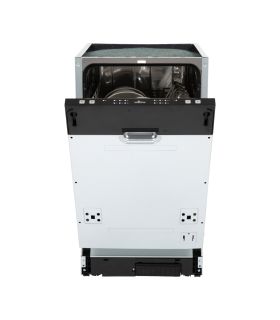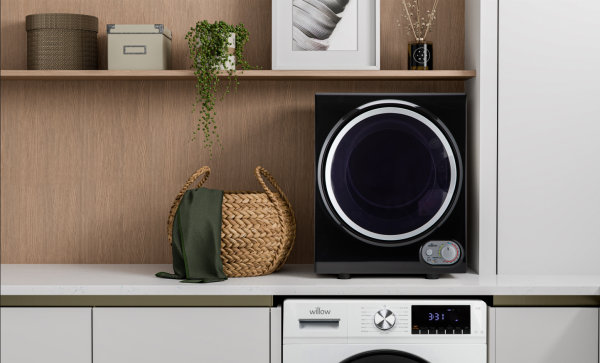Different dishwashers may have different wash cycles and features, but generally dishwashers work by following these steps:
- Pre-purge – Any water remaining from the previous cycle will be emptied.
- Fill – Water starts to be added to the basin based at the bottom of the appliance.
- Pre-wash – The spray arms start to rotate and spray the dishes with water to remove any debris.
- Heat – This step is where the dishwasher’s heating element starts to raise the water temperature to the level that is required for the selected wash cycle.
- Detergent – The detergent will then be released into the basin.
- Main wash – The rotating arms will then spray the dishes again, this time with the hot water and detergent. This gives the dishes a proper wash as the high water pressure will remove anything left on the items.
- Rinse – Fresh water is used to rinse the dishes, removing any leftover detergent.
- Dry – Residual heat in the dishwasher will dry the dishes. Some dishwashers may also have a dry cycle that will evaporate any remaining water by using a heating element to circulate hot air.
Yes, to get the most out of your dishwasher and to ensure that you are using it in the most energy efficient way, you should follow these guidelines:
- Don’t rinse your dishes – Although you might have heard that rinsing your dishes is a must before you put them in the dishwasher, this is a myth. Your dishwasher will have a pre-wash step which will rinse the dishes before the main wash commences. Rinsing the dishes beforehand may in fact inhibit the cleaning cycle as dishwasher detergent is designed to interact with the food particles on your dirty dishes. You should always ensure that there is no excess food left on any plates though as this can clog up the appliance.
- Don’t overcrowd – If too many items are crammed into the dishwasher, then there won’t be sufficient space for the water and detergent to flow over them. Try to only fill the dishwasher up according to the manufacturer's instructions and be prepared to run a couple of cycles efficiently instead of one. Don’t stack bowls or plates together to fit more in the dishwasher, this will make it difficult for the jets to thoroughly clean them.
- Don’t block the sprayer arms – If you overfill the dishwasher and block the sprayer arms, this means that the jets that wash and rinse your dishes won’t be able to reach all of the items.
- Place heavily soiled items face down – If you have any heavily soiled items, such as baking trays or casserole dishes, place them face down so that the spray arms can target them effectively.
- Place plastic at the top – If you have any dishwasher-safe plastic items, always place them towards the top of the dishwasher, furthest away from the heating element at the bottom. This is to ensure that the plastic doesn’t overheat and warp.
- Place glasses and mugs on the top rack – Always place glasses and mugs angled downwards on the top rack. This way they will be cleaned efficiently.
- Put larger items at the back – Any larger items such as chopping boards should be placed towards the back or the sides of the dishwasher. This is to ensure that they won’t disrupt the flow of the water during the wash cycle.
- Load utensils with the handle down – It’s important that you load the utensils with the dirtiest part downwards – this ensures that they can get a thorough clean. It’s also safer for knives to be loaded blade down.
There are a lot of different items that can’t be placed in a dishwasher. Usually, items that can be washed in a dishwasher will have a label indicating that they are ‘dishwasher safe’. Any items that don’t specify that they can be washed in a dishwasher or that have a ‘hand wash only’ label, should not be placed in a dishwasher but be hand washed instead.
Materials such as wood, cast iron, crystal, china and aluminium are not dishwasher safe and could be damaged if they are washed through the dishwasher.
- When wood is exposed to moisture and high heat and is then left to dry, it can warp, splinter and break.
- The heat and movement of a dishwasher can easily crack crystal, it’s highly recommended that any crystal glasses are carefully handwashed.
- Cast iron cookware rusts easily when exposed to moisture. Prolonged exposure to water in a dishwasher can cause irreparable damage to cast iron.
- Hand painted china is so delicate that even one cycle in a dishwasher could damage the finish and design. If the item has any metallic inclusions or trims, then these can easily tarnish and warp.
- If any aluminium items go through the dishwasher there is a risk of discolouration and damage due to the force and pressure inside the dishwasher during a cycle.
Dishwasher rinse aid is an integral part of your wash cycle, it is a drying agent and surfactant (meaning it lowers the surface tension of water and causes the water droplets to spread out into thin sheets) that helps dishes dry faster and helps to prevent water spots from forming. Whilst it is recommended to use rinse aid in your dishwasher, you can skip it if you feel like your dishes are clean and dry enough without it.
Dishwasher detergent is an important part of your wash cycle. It is essential for breaking down grease on your dishes and for removing tough food particles. Some detergents may also contain ingredients that will protect your glassware from etching and will help items to dry better. Regularly skipping dishwasher detergent could cause a build up of food residue, grease and grime in your dishwasher.






